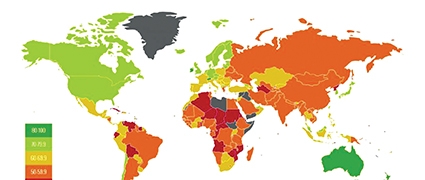Georgia 16th Place in 2018 Index of Economic Freedom
Georgia holds 16th place in the 2018 Index of Economic Freedom, which is published annually by the Heritage Foundation.
First launched in 1995, and covering 186 countries, the index evaluates countries in four policy areas affecting economic freedom: rule of law, government size; regulatory efficiency; and open markets. There are 12 specific categories: property rights, judicial effectiveness, government integrity, tax burden, government spending, fiscal health, business freedom, labor freedom, monetary freedom, trade freedom, investment freedom, and financial freedom. The scores in each category are averaged to create an overall score.
The world average score of 61.1 is the highest recorded in the 24-year history of the Index. Among the 180 countries ranked, the scores for 102 countries improved this year, while 75 declined. Just three were reported as remaining unchanged.
“Six economies earned the Index’s designation of “free” (scores of 80 or above), while the next 90 are classified as “mostly free” (70-79.9) or “moderately free” (60-69.9),” the statement, released following publication of this year’s Index, reads. “Thus, a total of 96 economies, more than half of all nations and territories graded in the 2018 Index, provide institutional environments in which individuals and private enterprises benefit from at least a moderate degree of economic freedom in the pursuit of greater economic development and prosperity.” It went on to note that the number of economically unfree economies remains high, with 63 considered “mostly unfree” (50-59.9) and 21 “repressed” (scores below 50).
The 10 countries that are ranked “most free” in the 2018 Index of Economic Freedom are 1) Hong Kong, 2) Singapore, 3) New Zealand, 4) Switzerland, 5) Australia, 6) Ireland, 7) Estonia, 8) United Kingdom, 9) Canada and 10) United Arab Emirates.
The “least free,” according to the report ,are: North Korea (ranked 180) Venezuela (179), Cuba (178), Rep. of Congo (177), Eritrea (176), Equatorial Guinea (175), Zimbabwe (174), Bolivia (173), Algeria (172) and Djibouti (171).
Georgia, with an overall score of 76.2, increased by 0.2 points, the report says. “With a substantial improvement in property rights offsetting modest declines in government integrity, judicial effectiveness, and fiscal health. Georgia is ranked 9th among 44 countries in the Europe region, and its overall score is above the regional and world averages.”
With regards to the rule of law in Georgia, the statement notes that, “the Constitution protects property rights, including ownership, acquisition, disposal, and inheritance of property. The enforcement of contracts has improved. The Constitution provides for an independent and impartial judiciary in civil matters, but the professionalism of civil judges and transparency of their adjudication is uncertain. Lingering Soviet-era corruption and ongoing Russian influence remain problematic.” As for the government size indicators and taxes, “the flat income tax rate is 20%, and the flat corporate tax rate 15%. Other taxes include value-added and dividends taxes. The overall tax burden equals 25.9% of total domestic income. Over the past three years, government spending has amounted to 29.8% of total output (GDP), and budget deficits have averaged 1.6% of GDP. Public debt is equivalent to 44.9% of GDP,” it says.
Moving on to explore regulatory efficiency, the publication notes that during 2016 in Georgia, “the reliability of electricity service improved, and protections for minority-stake investors were strengthened.”
“The cost of hiring a worker compares favorably to the cost in most other European countries, but the labor market lacks dynamism, and unemployment is fairly high. Dollarization of the economy is high; over 60% of bank loans are denominated in a foreign currency, and the local currency continued to devalue in 2017,” the publication indicates.
With regards to the open markets, the 2018 Index of Economic Freedom publication points to trade being “extremely important to the country’s economy; the combined value of exports and imports equals 103% of GDP. The average applied tariff rate is 0.3%. Non-tariff barriers impede some trade. In general, government policies do not significantly interfere with foreign investment. The growing banking sector offers improved access to financing, but the stock exchange remains small and underdeveloped,” it says.
For more about the 2018 Index of Economic Freedom, visit: https://www.heritage.org/index
Nino Gugunishvili











